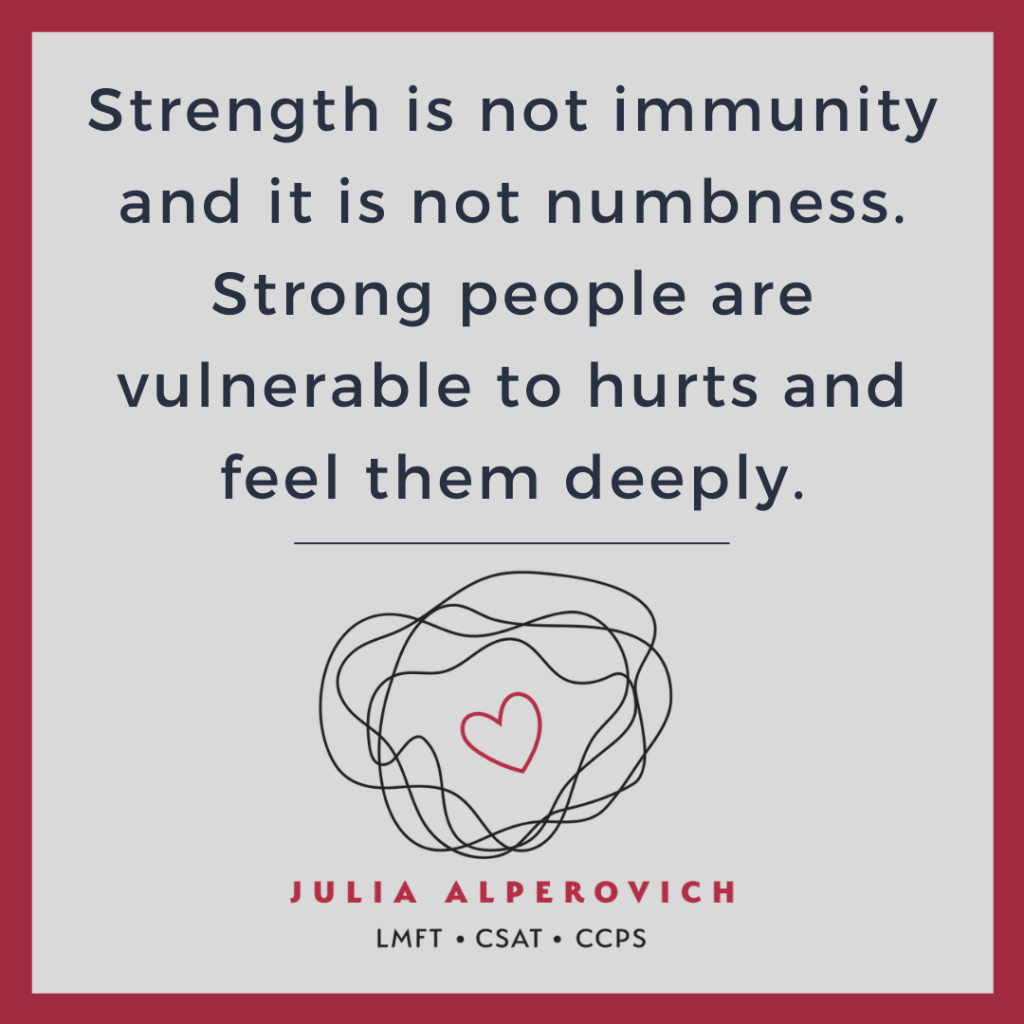A Personal Note from your Therapist on Strength. I am sure everyone knows that one person or is that one person who is always able to persevere and handle anything that is thrown their way. They handle crises with a calmness that is almost surreal, they remain composed during the toughest of circumstances, they rarely ask for help, and they seem to have a magical ability to endure everything. This person is often described as strong, tough, stoic, resilient and unwavering. But here’s the thing about strong people: just because they always get through everything ok, doesn’t mean they are ok while they are going through something.
I am one of these “strong” people. The people in my life have seen me go through multiple hardships and they have never questioned my ability to overcome. True to form, I always have. Somehow, I have managed to weather losses, obstacles and traumas, and I’ve seemingly become stronger from them. During these tough times, the people in my life felt the need to remind me of my strength and of how much greater my resolve is than anything I may be experiencing. I was rarely asked if I was ok or if I needed anything. And the truth is that I was, at times, not ok and I really could have used lots of things.
My point is not to guilt the people who love me, but to provide a bit of insight. Strength is not immunity and it is not numbness. Strong people are vulnerable to hurts and feel them deeply. Strength is also not a lack of need for support. Strength is simply a combination of patience, hope, unrelenting work ethic, and distress tolerance. Feelings are still felt, worries are still present, insecurities are still existent, and support is still desired. But when the surface seems calm and composed, an assumption is often made that the depth is equally as calm and composed and further inquiry is neglected.
Strong people learn over time that they are expected to always be strong and to never need help. When they actually do need help or feel their strength dwindle, they often feel unable to be honest about their struggle. This is reinforced by receiving messages such as “but you seem fine” or “I thought you were ok, you’re always ok” from their loved ones. And worse, their loved ones may not be supportive when they are asked to be because it is unfamiliar to them and they don’t know how to do so. After all, their loved ones have often been the recipients of support from the strong person, not the other way around.
Strong people often become strong because of life experiences. They are often parentified children in their families of origin or are put in caregiver roles from a young age. They learn to put their own needs aside to fill a role and to fit a dynamic which was not chosen by them. They often do this without expectation of recognition or appreciation. It is simply what has to happen to maintain homeostasis in their environments. The more they play this role, the more they are expected to remain in the role. Many strong people lack awareness of their part in this and continue to play this role unwittingly throughout their lives.
If you know a strong person, you should be aware that you also know a sensitive, generous and accommodating person. You should also be very mindful of your expectations of this person and your assumptions about this person. Their strength does not eliminate their pain nor their need for support. Ask them how they’re doing, offer to help them, validate them on those rare occasions when they actually divulge their struggles, and let them know that it’s ok for them to need something and to feel like they can’t handle something on their own.
If you are a strong person, you should know that you don’t have to shoulder everything on your own. It’s ok to ask for help and it’s ok to feel tired. It’s ok to admit defeat and it’s ok to crumble. It just may be an indication that it is now someone else’s turn to step in and be strong. You may be someone else’s rock, but you are not made of stone. You are human and you deserve to receive the love of your tribe. But they can only give it to you if you let them, and to let them means you have to be vulnerable. So speak up when you’re struggling, ask for help when you need it, and know that your strength shows even more clearly when you are strong enough to be weak.
If you need help, weak or strong, I am available for counsel.


